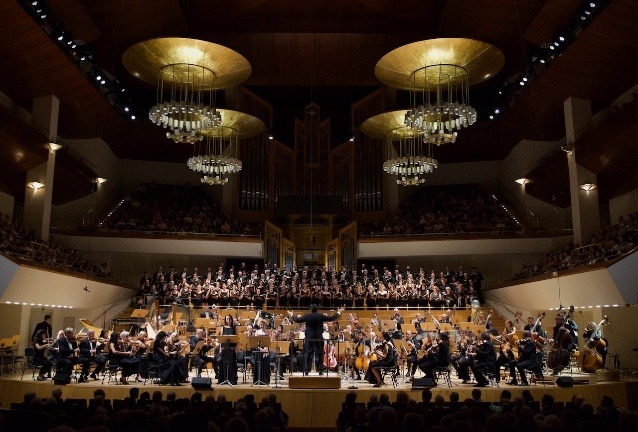Requiem of Ligeti. OCNE and David Afkham. © 2022 by Rafa Martin
Madrid, Friday, September 23, 2022.
Symphony Hall of the National Auditorium. György Ligeti, Requiem. Richard Strauss, Eine Alpensinfonie op 64. Jenny Daviet, soprano. Barbara Kozelij, mezzo-soprano. Antonio González Alonso and Alfonso Martín González, basses. Choir of the Community of Madrid (Josep Vila i Casañas, director). Bilbao Choral Society (Enrique Azurza, director). National Orchestra and Choir of Spain (MA García Cañamero, conductor). David Afkham, music director. Symphonic Cycle of the OCNE 01. Attendance, 90% of the capacity.
0.000419
In the five decades that I have been listening to the National Orchestra and Choir of Spain, I do not remember any other occasion in which I have experienced the degree of interpretative intensity reached by this Requiem (1963-65) by Gyorgy (1923-2006) that opened this 2022/23 season of the OCNE.
The goddess Fortuna propitiated a conjunction of elements that allowed it to reach a very infrequent state of grace that -when it occurs- shocks all the attendees, the public and the performers. The closest thing I remember was at the opening of the 2005/06 season of the OCNE- with the interpretation of the (1962) Benjamin a work closely related to the Requiem of Ligeti.
Both creators were agnostic and deeply spiritual, wounded by the warlike and tyrannical experiences that marked their biographies, and shocked by the apparent imminence of a nuclear war at the moments in which they coincided and produced their respective requiems.
Often the differences Stylistic differences -more apparent than real- between Britten and Ligeti have made invisible the great mental, conceptual, aesthetic, political and rhetorical parallelism between both twilight works, which I cannot fail to relate to another monument of spirituality, A Love supreme (1965) John recorded in the USA when there was an upsurge in racial strife, the Vietnam War and the student riots.
The choirs of the Community of Madrid, the Bilbao Choral Society and the National Choir of Spain became a single body, a single breath that achieved prodigious dynamics both in its enormous breadth and in the smallest nuances. The ONE, for its part, shone well above its usual outstanding qualities. Antonio González Alonso and Alfonso Martín González, the two thrilling basses of the National Choir of Spain, exhibited vocal and expressive depths worthy of a great liturgical singer orthodox. Barbara and Jenny Daviet reached the enviable degree of maximum decorum, which in David is even greater merit because its vocal timbre has a priori some filling conflicts with the general color of the Requiem.
David He was completely right in favoring his role as coordinator not only of the entire ensemble but also of these with the privileged acoustics of the Symphony Hall of the National Auditorium bequeathed to us by its architect, José María García de Paredes (1924-1990).
The acclamations of the public were tremendous. Never before had I seen anyone cry in the audience at the National Auditorium and during the break – on the way to the toilets – I constantly heard emotional comments.
Without the slightest doubt, Afkham wanted to open the new post-covid season with a memorable “program.” In the second part, the stage of the National Auditorium, now without the choirs, was again crammed with musicians to perform Eine Alpensinfonie (1915), the last symphonic poem by Richard Strauss that is often considered the “swan song” of the genre … without noticing that the genre continues to enjoy full vitality converted into wonderful cinematographic OST that have not ceased to drink from the inexhaustible Straussian spring. Like any self-respecting “twilight” creation, Eine Alpensinfonie is a spectacular work, even excessive, qualities transmitted to his most illustrious sons such as LostHorizon (1937) by Dimitri Tiomkin, Gone with the wind (1939) by Max Steiner, The Magnificent Seven (1960) by Elmer Bernstein, or starwars (1977) by John Williams.
The clear, discursive, meticulous execution that Afkham and ONE offered us Eine Alpensinfonie can only be described as exemplary. But an exemplary performance does not necessarily imply an outstanding interpretation, it only shows that the conductor and the orchestra are competent and that they have done a good job in rehearsals. Afkham gave us a gentle version of the walk in the Alps, and even the storm seemed like a fitting anecdotal incident to recount, back in the tavern over a large mug of ale. The total absence of spectacularity created a strong contrast with the intense interpretation of the Requiem, induced loss of attention, disinterest and, at times, boredom. which, when it rings Eine Alpensinfonie, it is a serious problem. All the magic of the first part had evaporated, only that generated by the magnificent acoustics of the room remained.
Ligeti’s Requiem and the legacy of José María García de Paredes

